Saving Malaysia has been this month’s campaign by the Malaysian bloggers exposing the dark side of Anwar Ibrahim a.k.a. BABI – Brother Anwar Bin Ibrahim who desperately wanted to become the next Prime Minister of Malaysia. This BABI would do anything above the laws even inciting hatred, war and racism among the complex Malaysians’ multicultural ethnics.
Some say when a person is so desperate to win no matter by what means, will naturally become bias in his thinking and would unwittingly possess clouded judgment where his notoriety then draws huge publicity. You know what we mean!
The future of all Malaysians now is a lot at stake presumably be falling into the hands of IMF – International Monetary Fund which BABI had tried bringing into Malaysia since 1998. The history of Malaysia’s worst recession started back in 1998 where a JEW business man also a closet politician known as George Soros was trying to gain entry into Malaysia economy via stock speculations. George Soros at that time had sought the collaboration with BABI to contain Malaysia from progressing freely in the world of strong economy.
Today, the vicious cycle is now repeated by BABI once again. The truth behind George Soros attempted invasion into Malaysia strong economy is the attraction on the recession-proof program that Najib Tun Razak has been endorsing after decades long of well-researched by his economists team. (ooops..should we stop telling the truth?)
Malaysia today may have found the recession-proof strategy that could ostensibly indicated by the state of its current unemployment rate which still falling below 3.5%. The success of Najib Tun Razak’s administration is to contain the wildest unemployment rates allowing the citizens of Malaysia to be productive despite the current recession in domino stages worldwide.
Looking at this chart below which indicated the ongoing recession worldwide particularly hitting hard at the United States with almost parallel to the European current unemployment rate; states the truth of Malaysia’s strong economy as compared to the west.
Certainly, many would have said that the west is a larger state than Malaysia. However, the truth is Malaysia has the strongest economy strength than the west which attracted George Soros to invest in Malaysia. Still, the Malaysian government never forget the incident of speculating the KL stock exchange in 1998 that almost led Malaysia into declaring bankruptcy.
A lot of us do not understand how important it is to sustain a strong economy during the recession period – here we could share a little information of what we believe is the best government so far in Asia. The Malaysia government has formulated the best strategy to curb unemployment rate from rising higher despite the hit of recession where massive jobs were created and low cost housing is on the pipeline to improve the local lifestyle. In this reference, we say Malaysia Prime Minister Najib Tun Razak has done well to save Malaysia from falling into the hands of the foreign power.
Today in Japan, it recorded a higher unemployment rate of 4.3% than analyzed which is still controllable as compared to the West.
Here in this chart below would indicated evidently that the WEST is infected with higher unemployment rate so far so true that THE WEST is interested to learn from the Malaysian government by introducing IMF – International Monetary Fund. The trick is IMF may not be the best solution for Malaysian government given the exemplary set by neighboring ASEAN countries where it contributes higher inflation to the affected country.
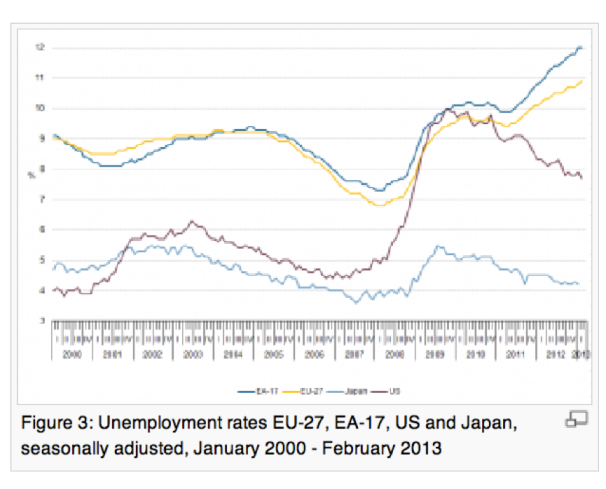 Most economists now believe that low; stable and most importantly predictable inflation is good for an economy. If inflation is low and predictable; it is easier to capture it in price adjustment contracts and interest rates reducing its distortionary impact. Moreover; knowing that prices will be slightly higher in the future gives the consumer an incentive to make purchases sooner, which boosts economy activity. Many central bankers have made their primary policy objective maintaining low and stable inflation; a policy called “Inflation targeting”.
Most economists now believe that low; stable and most importantly predictable inflation is good for an economy. If inflation is low and predictable; it is easier to capture it in price adjustment contracts and interest rates reducing its distortionary impact. Moreover; knowing that prices will be slightly higher in the future gives the consumer an incentive to make purchases sooner, which boosts economy activity. Many central bankers have made their primary policy objective maintaining low and stable inflation; a policy called “Inflation targeting”.
What creates inflation?
Long-lasting episodes of high inflation are often the result of lax monetary policy. If the money supply grows too big relative to the size of an economy; the unit value of the currency diminishes; in other words; its purchasing power falls and prices rise.
When banks lower interest rates or a government raises spending; it can temporarily boost overall demand and economic growth. In such cases, it may be unwise to have adopted International Monetary Policy where IMF have recruited 45 governments that discussed framework for post-World War II international economic cooperation back in those early days. Those participating countries were concerned with the rebuilding of Europe and the global economic system after the war suggested on the role of IMF as a global economic institution.
In reality, it was imagined by the British economist that the IMF would be a cooperative fund upon which member states could draw to maintaining economic activity and employment through periodic crises with his view suggested an IMF that helped governments also act as the US government in response to World War II.
The truth? Viewing the statistic of the unemployment rate on Malaysia; does it need IMF?
During the Great Depression, countries sharply raised barriers to foreign trade in an attempt to improve their failing economies which led to the devaluation of national currencies and a decline in world trade.
The rationale – Is Malaysian’s current national currencies has been devalued? Is Malaysia suffering from failing economies? Under IMF – which countries are suffering from higher unemployment rate and its national currencies become weaker?
Time for IMF to reform its policy by not recruiting more member states with its failing policies.
The Malaysian government under Najib Tun Razak found the right balance boosting growth without overstimulating its economy and causing inflation.
However, will the Malaysians wiser enough to know of this?
Ten reasons for opposing IMF – What is the IMF?
The International Monetary Fund and the World Bank were created in 1944 at a conference in Bretton Woods, New Hampshire, and are now based in Washington, DC. The IMF was originally designed to promote international economic cooperation and provide its member countries with short term loans so they could trade with other countries (achieve balance of payments). Since the debt crisis of the 1980’s, the IMF has assumed the role of bailing out countries during financial crises (caused in large part by currency speculation in the global casino economy) with emergency loan packages tied to certain conditions, often referred to as structural adjustment policies (SAPs). The IMF now acts like a global loan shark, exerting enormous leverage over the economies of more than 60 countries. These countries have to follow the IMF’s policies to get loans, international assistance, and even debt relief. Thus, the IMF decides how much debtor countries can spend on education, health care, and environmental protection. The IMF is one of the most powerful institutions on Earth — yet few know how it works.
-
The IMF has created an immoral system of modern day colonialism that SAPs the poor — along with the WTO and the World Bank — has put the global economy on a path of greater inequality and environmental destruction. The IMF’s and World Bank’s structural adjustment policies (SAPs) ensure debt repayment by requiring countries to cut spending on education and health; eliminate basic food and transportation subsidies; devalue national currencies to make exports cheaper; privatize national assets; and freeze wages. Such belt-tightening measures increase poverty, reduce countries’ ability to develop strong domestic economies and allow multinational corporations to exploit workers and the environment A recent IMF loan package for Argentina, for example, is tied to cuts in doctors’ and teachers’ salaries and decreases in social security payments.. The IMF has made elites from the Global South more accountable to First World elites than their own people, thus undermining the democratic process.
-
The IMF serves wealthy countries and Wall Street – Unlike a democratic system in which each member country would have an equal vote, rich countries dominate decision-making in the IMF because voting power is determined by the amount of money that each country pays into the IMF’s quota system. It’s a system of one dollar, one vote. The U.S. is the largest shareholder with a quota of 18 percent. Germany, Japan, France, Great Britain, and the US combined control about 38 percent. The disproportionate amount of power held by wealthy countries means that the interests of bankers, investors and corporations from industrialized countries are put above the needs of the world’s poor majority.
-
The IMF is imposing a fundamentally flawed development model – Unlike the path historically followed by the industrialized countries, the IMF forces countries from the Global South to prioritize export production over the development of diversified domestic economies. Nearly 80 percent of all malnourished children in the developing world live in countries where farmers have been forced to shift from food production for local consumption to the production of export crops destined for wealthy countries. The IMF also requires countries to eliminate assistance to domestic industries while providing benefits for multinational corporations — such as forcibly lowering labor costs. Small businesses and farmers can’t compete. Sweatshop workers in free trade zones set up by the IMF and World Bank earn starvation wages, live in deplorable conditions, and are unable to provide for their families. The cycle of poverty is perpetuated, not eliminated, as governments’ debt to the IMF grows.
-
The IMF is a secretive institution with no accountability – The IMF is funded with taxpayer money, yet it operates behind a veil of secrecy. Members of affected communities do not participate in designing loan packages. The IMF works with a select group of central bankers and finance ministers to make polices without input from other government agencies such as health, education and environment departments. The institution has resisted calls for public scrutiny and independent evaluation.
-
IMF policies promote corporate welfare – To increase exports, countries are encouraged to give tax breaks and subsidies to export industries. Public assets such as forestland and government utilities (phone, water and electricity companies) are sold off to foreign investors at rock bottom prices. In Guyana, an Asian owned timber company called Barama received a logging concession that was 1.5 times the total amount of land all the indigenous communities were granted. Barama also received a five-year tax holiday. The IMF forced Haiti to open its market to imported, highly subsidized US rice at the same time it prohibited Haiti from subsidizing its own farmers. A US corporation called Early Rice now sells nearly 50 percent of the rice consumed in Haiti.
-
The IMF hurts workers – The IMF and World Bank frequently advise countries to attract foreign investors by weakening their labor laws — eliminating collective bargaining laws and suppressing wages, for example. The IMF’s mantra of “labor flexibility” permits corporations to fire at whim and move where wages are cheapest. According to the 1995 UN Trade and Development Report, employers are using this extra “flexibility” in labor laws to shed workers rather than create jobs. In Haiti, the government was told to eliminate a statute in their labor code that mandated increases in the minimum wage when inflation exceeded 10 percent. By the end of 1997, Haiti’s minimum wage was only $2.40 a day. Workers in the U.S. are also hurt by IMF policies because they have to compete with cheap, exploited labor. The IMF’s mismanagement of the Asian financial crisis plunged South Korea, Indonesia, Thailand and other countries into deep depression that created 200 million “newly poor.” The IMF advised countries to “export their way out of the crisis.” Consequently, more than US 12,000 steelworkers were laid off when Asian steel was dumped in the US.
-
The IMF’s policies hurt women the most – SAPs make it much more difficult for women to meet their families’ basic needs. When education costs rise due to IMF-imposed fees for the use of public services (so-called “user fees”) girls are the first to be withdrawn from schools. User fees at public clinics and hospitals make healthcare unaffordable to those who need it most. The shift to export agriculture also makes it harder for women to feed their families. Women have become more exploited as government workplace regulations are rolled back and sweatshops abuses increase.
-
IMF Policies hurt the environment – IMF loans and bailout packages are paving the way for natural resource exploitation on a staggering scale. The IMF does not consider the environmental impacts of lending policies, and environmental ministries and groups are not included in policy making. The focus on export growth to earn hard currency to pay back loans has led to an unsustainable liquidation of natural resources. For example, the Ivory Coast’s increased reliance on cocoa exports has led to a loss of two-thirds of the country’s forests.
-
The IMF bails out rich bankers, creating a moral hazard and greater instability in the global economy – The IMF routinely pushes countries to deregulate financial systems. The removal of regulations that might limit speculation has greatly increased capital investment in developing country financial markets. More than $1.5 trillion crosses borders every day. Most of this capital is invested short-term, putting countries at the whim of financial speculators. The Mexican 1995 peso crisis was partly a result of these IMF policies. When the bubble popped, the IMF and US government stepped in to prop up interest and exchange rates, using taxpayer money to bail out Wall Street bankers. Such bailouts encourage investors to continue making risky, speculative bets, thereby increasing the instability of national economies. During the bailout of Asian countries, the IMF required governments to assume the bad debts of private banks, thus making the public pay the costs and draining yet more resources away from social programs.
-
IMF bailouts deepen, rather then solve, economic crisis – During financial crises — such as with Mexico in 1995 and South Korea, Indonesia, Thailand, Brazil, and Russia in 1997 — the IMF stepped in as the lender of last resort. Yet the IMF bailouts in the Asian financial crisis did not stop the financial panic — rather, the crisis deepened and spread to more countries. The policies imposed as conditions of these loans were bad medicine, causing layoffs in the short run and undermining development in the long run. In South Korea, the IMF sparked a recession by raising interest rates, which led to more bankruptcies and unemployment. Under the IMF imposed economic reforms after the peso bailout in 1995, the number of Mexicans living in extreme poverty increased more than 50 percent and the national average minimum wage fell 20 percent.
This article below reveals the immoral behaviorism by Anwar Ibrahim posted by this superblog AIDC that contains the real story behind Anwars’ disgusting sodomizing cases by Yuktes Vijay who were one of Anwar’s lawyers at that time.
Yuktes Vijay : The real story behind Sodomy 2 – Part 2
This article is in response to the claims of Dato Omar Abu Bakar in a video that was shared by Anwar Ibrahim on Facebook.
Why Anwar was in the apartment?
Anwar at various times claimed that he was in the apartment to meet some economists. However, none of these claims was ever substantiated. Not even one of the economist were brought to court to verify their presence with Anwar in court.
The truth is the defense council did interview 2 of the economists but they declined to take stand to support Anwar. Why? Were they really present there? Ask Anwar. This was indeed baffling as their evidence would have given Anwar a chance to prove to the general public that it was INDEED A BN CONSPIRACY.
Anwar claims he was set up but the question is what was he doing in the apartment? Typical Anwar. He puts the blame on one and all but fails to provide the sufficient and relevant evidence to come clean when he has the chance to do so.
Remember China Doll-Omega saga? If only he had shown his Omega watch or denied having one, he would not have the need to flash his tummy in every speeches or press conferences to prove his innocence. Well, the truth is at that point of time, he did have a tummy which was carefully concealed by a bullet vest which made him look not having a tummy. How I know this? I should thank Anwar for the wonderful tea he served in his house on March 21 2011. What happened on this day? Google it up!
The landlord of the apartment
The landlord, his wife and 2 maids were brought as defence witness’ for interview in KL High Court. Even he declined to be a witness. Imagine this. I have a friend. He gives me his house to have interviews, talks and even negotiations with people but hesitates to take the stand for you. I overheard a lot of disturbing things during this course of interview. For the record, the interview with the landlord was the longest and yet he did not take the stand.
What was spoken here and discussed here? I am privy to the information but I am declining to reveal much for now as I fear for my safety. Not wanting to sound dramatic but I do know the amount of harassing calls I am getting every single day.
All information that I know with regards to the issues that I have highlighted here will be out in my final part. Part 3. I promise to release it on nomination day. Part 3 will include the real story of why the house owner hesitated, alibi list, Anwar’s flip-flop game with the defense counsels, and PM Najib’s name was brought in to smear his credibility.
Cukuplah Anwar. Stop lying. Please —> “It’s enough Anwar, please stop lying”
Yuktes Vijay
What we hope is to see a strong government for Malaysia sustaining our economy without the interference of foreign power! That leaves us only with Najib Tun Razak to carry on building Malaysia higher and stronger without playing our backside.
Especially with BABI of his immorality and obscenity, obscuring the interference of foreign power to the knowledge of Malaysian people; can the Malaysians really trust such immoral figure who so ambitiously wanted to be the next Prime Minister who also may be facing his judgment day behind bars sooner? The choice is yours; Malaysians whether you see through it or you see just half of it. Stay tuned!!!

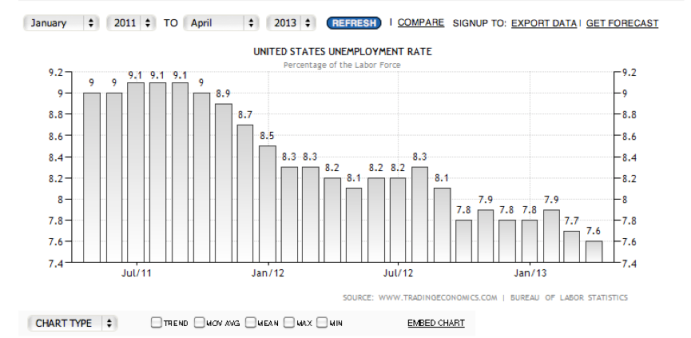
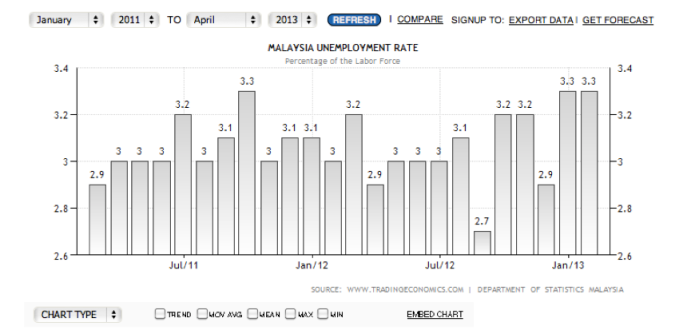
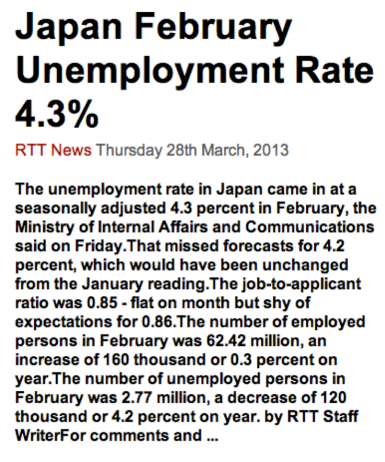
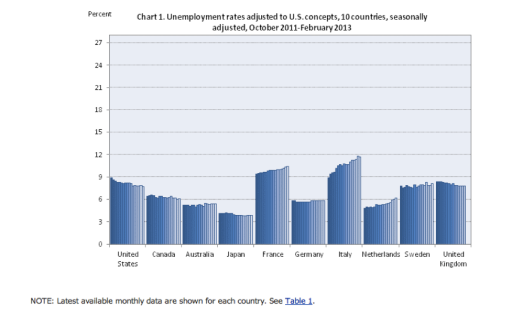
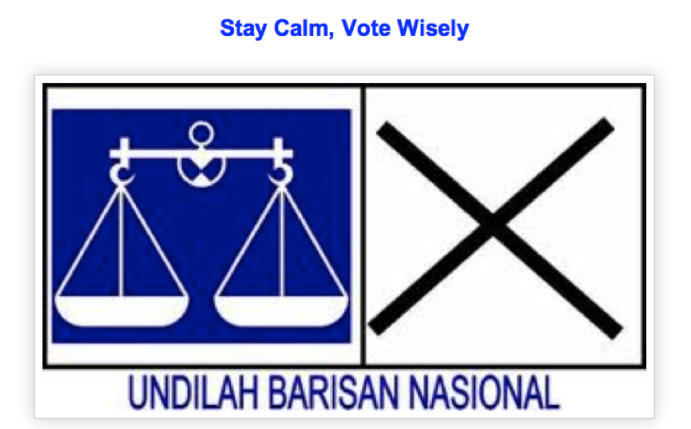
How la? Malindo?
http://www.dailymail.co.uk/news/article-2308475/Bali-plane-crash-Miracle-escape-108-passengers-plane-overshoots-runway-lands-SEA.html